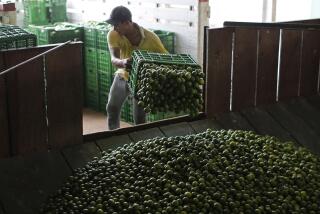3rd Chiapas Military Base Is Closed
- Share via
MERIDA, Mexico — The Mexican government Wednesday shut down a third military base in Chiapas state in what Foreign Secretary Jorge Castaneda called a confidence-building measure intended to encourage Zapatista rebels to return to the negotiating table.
As part of a cautious but steady series of steps to reduce the military presence in the troubled southern state, the army dismantled and abandoned a base outside the town of Ocosingo.
The Zapatista rebel leader who calls himself Subcommander Marcos has set three conditions for the resumption of peace talks to formally end a 1994 uprising waged to demand greater rights for the region’s indigenous Maya people. Marcos called on the government to close seven military bases, free political prisoners and adopt legislation recognizing traditional indigenous political and cultural rights.
President Vicente Fox, who took office Dec. 1 as the first president from outside the long-dominant Institutional Revolutionary Party, or PRI, has in recent weeks submitted the indigenous-rights legislation to Congress and secured the release of 23 Zapatistas held on various offenses.
The military base that was closed Wednesday was the third to be shut. It virtually overlooked a pro-Zapatista encampment called Moises Gandhi, and troops at the base routinely monitored the movements of the pro-Zapatista villagers.
Marcos chided Fox in a communique Sunday, charging that the government had actually increased the number of troops at the Ocosingo barracks, called Cuxulja, and another site. Marcos asked, “How many times has Fox said contradictory things about Chiapas?”
Castaneda, in a telephone interview from New York, said the closure of the Cuxulja base was “proof of the government’s good faith in doing what has to be done to renew negotiations and to address the spirit and, within reason, the letter of the conditions” issued by Marcos.
“We think that, up to a point, they do have a point in asking for these things to renew the confidence that was lost,” said the foreign secretary, a political scientist and outspoken critic of the former PRI government.
“We are taking a series of confidence-building steps, unilaterally,” Castaneda said. “We agree there is an asymmetry. We think we have to gain their confidence.”
He acknowledged that there are physical and political risks in making a series of gestures if there is no positive response from the Zapatistas but said there are even greater risks in allowing the stalemate to drag on. Hundreds have died in periodic outbreaks of violence in Chiapas since a cease-fire was declared in January 1994 after a brief but bloody shooting war.
The government also has removed restrictions on human rights observers in Chiapas. The previous government expelled scores of activists and observers.
At the Cuxulja base, the government’s Chiapas negotiator, Luis H. Alvarez, told reporters the government has no timetable for its detente program in Chiapas and further troop reductions other than “the sooner the better.”
Rebel supporters near the base issued a statement saying: “Our war is a war against oblivion. When all the conditions are met, we will be satisfied; then we will sit down for dialogue.”
More to Read
Sign up for Essential California
The most important California stories and recommendations in your inbox every morning.
You may occasionally receive promotional content from the Los Angeles Times.













